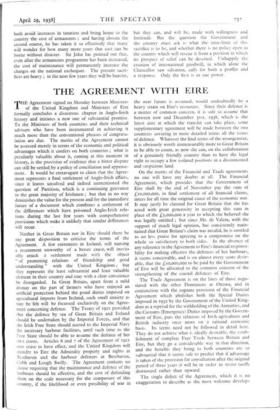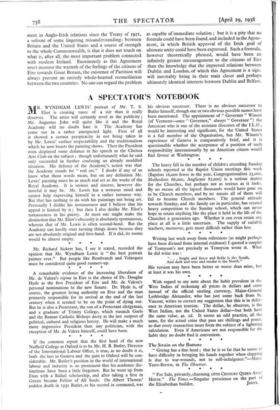THE AGREEMENT WITH EIRE THE Agreement signed on Monday between
Ministers of the United Kingdom and Ministers of Eire formally concludes a disastrous chapter in Anglo-Irish history and initiates a new one of substantial promise. To the Ministers of both countries and their technical advisers who have been instrumental in achieving it much more than the conventional phrases of congratu- lation are due. The merits of the Agreement cannot be assessed merely in terms of the economic and political advantages which it confers on both countries ; what is peculiarly valuable about it, coming at this moment in history, is the provision of evidence that a bitter dispute can still be settled by a policy of conciliation and appease- ment. It would be extravagant to claim that the Agree- ment represents a final settlement of Anglo-Irish affairs, since it leaves unsolved and indeed unmentioned the question of Partition, which is a continuing grievance to the great majority of Irishmen ; but that in no way diminishes the value for the present and for the immediate future of a 'document which combines a settlement of the differences which have poisoned Anglo-Irish rela- tions during the last few years with comprehensive provisions which make it unlikely that similar differences will recur.
Neither in Great Britain nor in Eire should there be any great disposition to criticise the terms of the Agreement. A few extremists in Ireland, still nursing a resentment unworthy of a better cause, will inevit- ably attack a settlement made with the object "of promoting relations of friendship and good understanding" with the United Kingdom ; but they represent the least substantial and least valuable element in their country and may with a clear conscience be disregarded. In Great Britain, apart from a mild dismay on the part of farmers who have enjoyed an artificial protection behind the penal duties imposed on agricultural imports from Ireland, such small anxiety as may be -felt will be focussed exclusively on the Agree- ment concerning defence. The Treaty of 1921 provided that the defence by sea of Great Britain and Ireland should be undertaken by the Imperial Forces, and that he Irish Free State should accord to the Imperial Navy :he necessary harbour facilities, until such time as the Free State should be able to assume the defence of her own coasts. Articles 6 and 7 of the Agreement of 1921 now cease to have effect, and the United Kingdom will transfer to Eire the Admiralty property and rights at Befehaven and the 'harbour defences at Berehaven, Cobh and Lough Swilly. The Agreement contains no clause requiring that the maintenance and defence of the harbours should be effective, and the cost of defending them on the scale necessary for the composure of this country, if the likelihood or even possibility of war in the near future is assumed, would undoubtedly be a heavy strain on Eire's resources. Since their defence is a- matter of common concern, it is safe to assume that between now and December 31st, 1938, which is the latest date at which the transfer can take place, some supplementary agreement will be made between the two countries covering in more detailed terms all the issues of defence. Whatever the final terms of the arrangement, it is obviously worth immeasurably more to Great Britain to be able to count, as now she can, on the collaboration of a genuinely friendly country than to have the legal right to occupy a few isolated positions in a discontented and suspicious land.
On the merits of the Financial and Trade agreements no one will have any doubts at all. The Financial Agreement, which provides that the Government of Eire shall by the end of November pay the sum of £10,000,000, in final settlement of all financial claims, inters for all time the original cause of the economic war. It may justly be claimed for Great Britain that she has acted with great generosity in accepting this sum in place of the L5,00o,00o a year to which she believed she was legally entitled ; but since Mr. de Valera, with the support of much legal opinion, has consistently main- tained that Great Britain's claim was invalid, he is entitled to no less praise for agreeing to a compromise on the whole so satisfactory to both sides. In the absence of any reference in the Agreement to Eire's financial responsi- bility for making effective the defences of her harbours, it seems conceivable, and is on almost every score desir- able, that the £fo,000,000 to be paid by the Government of Eire will be allocated to the common concern of the strengthening of the coastal defences of Eire.
The Trade Agreement is on the lines of those nego- tiated with the other Dominions at Ottawa, and in conjunction with the cognate provision of the Financial Agreement which abolishes both the Special Duties imposed in 1932 by the Government of the United King- dom as a reprisal for the withholding of the Annuities, and the Customs (Emergency) Duties imposed by the Govern- ment of Eire, puts the relations of Irish agriculture and British industry once more on a rational economic basis. Its terms need not be followed in detail here. They do not achieve what is ideally desirable, the estab- lishment of complete Free Trade between Britain and Eire, but they go a considerable way in that direction, and the benefits they bring to both countries are so substantial that it seems safe to predict that if advantage is taken of the provision for consultation after the original period of three years it will be in order to revise tariffs downward rather than upward.
The single defect of the Agreement, which it is no exaggeration to describe as the most welcome develop- ment in Anglo-Irish relations since the Treaty of 1921, a solvent of some lingering misunderstandings between Britain and the United States and a source of strength to the whole Commonwealth, is that it does not touch on what is, after all, the most important problem connected with modern Ireland. Enormously as this Agreement must increase the warmth of the feelings of the citizens of Eire towards Great Britain, the existence of Partition will always prevent an entirely whole-hearted reconciliation between the two countries. No one can regard the problem as capable of immediate solution ; but it is a pity that no formula could have been found, and included in the Agree- ment, in which British approval of the Irish goal of ultimate unity could have been expressed. Such a formula, however -theoretically phrased, would have been an infinitely greater encouragement to the citizens of Eire than the knowledge that the improved relations between Dublin and London, of which this Agreement is a sign, will inevitably bring in their train closer and perhaps ultimately identical interests between Dublin and Belfast.



























































 Previous page
Previous page